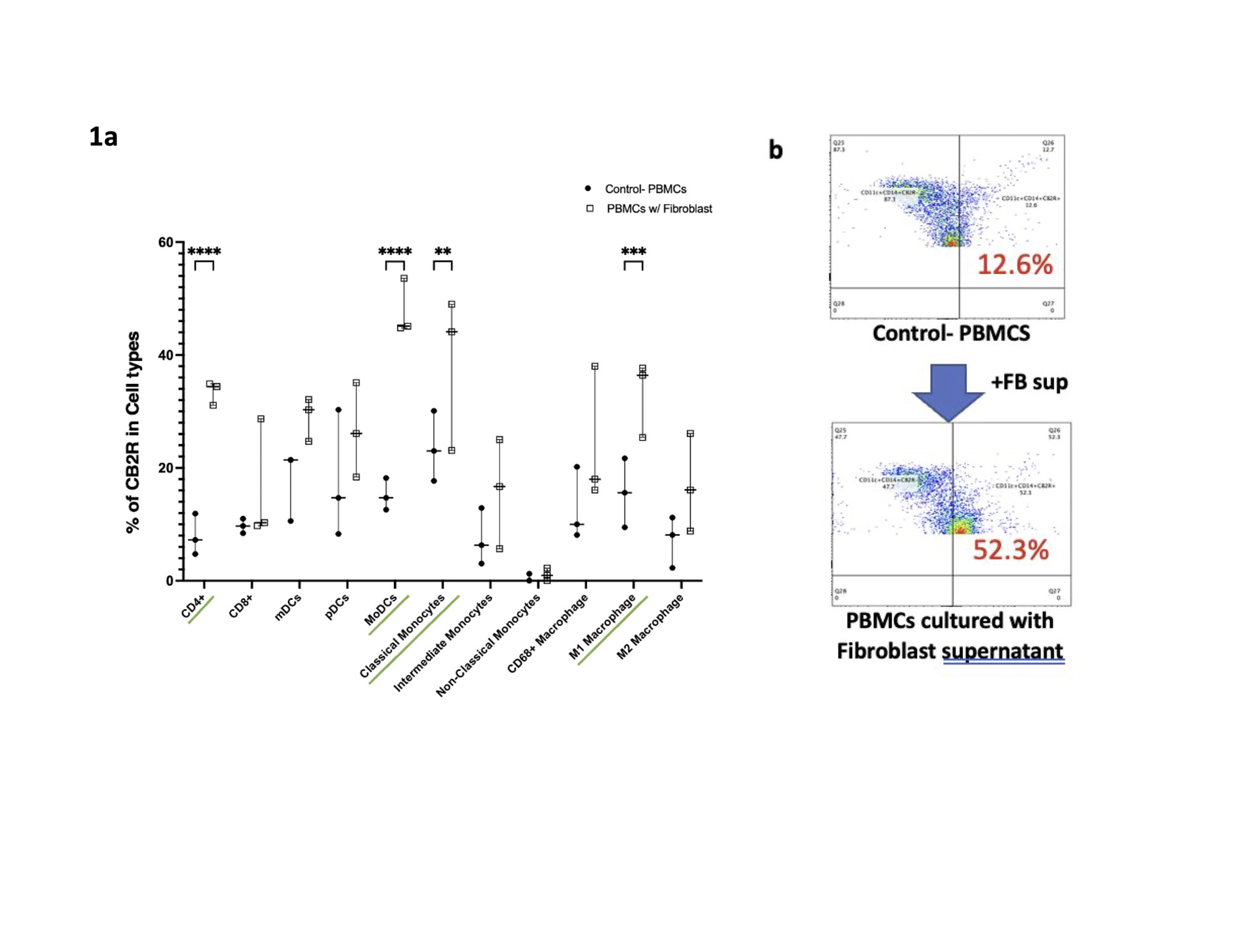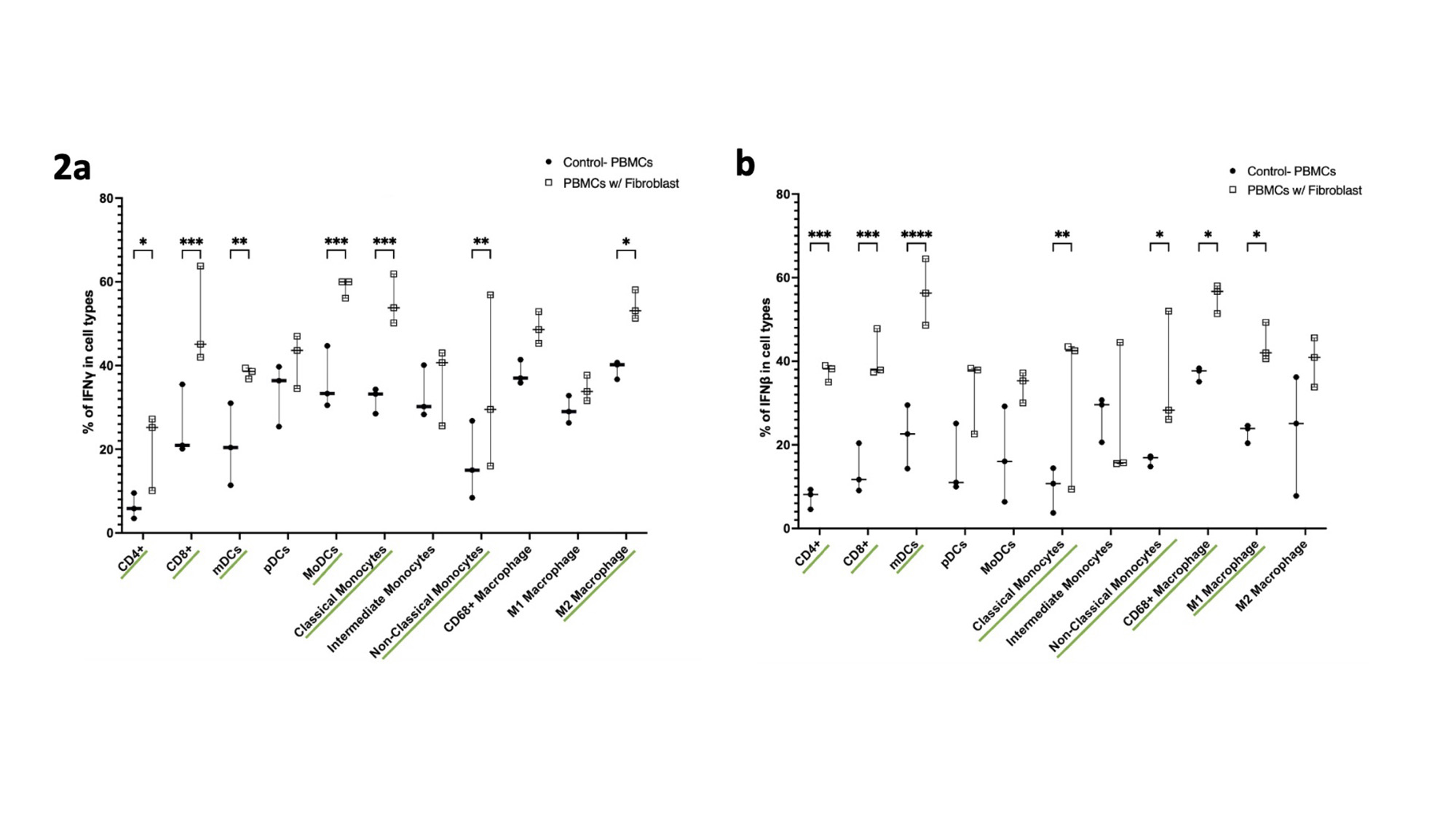Session Information
Date: Sunday, November 12, 2023
Title: (0066–0095) T Cell Biology & Targets in Autoimmune & Inflammatory Disease Poster
Session Type: Poster Session A
Session Time: 9:00AM-11:00AM
Background/Purpose: Dermatomyositis (DM) is a chronic, systemic autoimmune disease affecting the skin, muscle, and lungs. The activation of CB2R has been shown to reduce several, key proinflammatory cytokines implicated in DM. Our group has previously shown that CB2R expression was significantly increased in in DM skin compared to blood, possibly due to increased production of local inflammatory cytokines. CB2R stimulation alleviates inflammatory response by down-regulating the expression of TNF-α, IL31, IFN-γ, and type I interferon expression in the early stage of inflammation and reducing the infiltrated inflammatory cells. Having more CB2R on inflammatory cells will lead to enhanced effects of a CB2R agonist. We hypothesized that fibroblasts (FBs) in the skin may play an important role in upregulating CB2R on inflammatory cells within the skin. Dermal fibroblasts produce and organize the extracellular matrix of the dermis. They also communicate with each other and other cell types. Therefore, we sought to examine the role of FBs in CB2R activation.
Methods: DM PBMCs, which typically have minimal CB2R expression, were cultured with medium with or without human FB supernatant. PBMCs from DM patients were cultured for 24 hrs with control medium at 1:1 dilution with or without fibroblast supernatant retrieved from a 6 well plate of 40-50% confluent primary fibroblast. We then utilized multiplexed flow cytometry to further analyze the expression of CB2R and inflammatory cytokines on 12 cell lineages.
Results: When comparing PBMCs cultured with and without FB supernatant, cells cultured with FB supernatant had a significant increase in CB2R expression on CD4+ T cells (p < 0.0001), monocyte-derived dendritic cells (moDCs) (p < 0.0001), classical Monocytes (CM) (p < 0.001), and M1 Macrophages (p < 0.0001). (Figure 1a) There was also a significant increase in inflammatory cells cytokines. When comparing PBMCs cultured with and without FB supernatant, cells cultured with FB supernatant had a significant increase in intracellular IFNγ and IFNβ expression in CD4+ T cells (p < 0.01);p < 0.001), CD8+T cells (p < 0.001; p< 0.001 ), CD11c+ cells (p < 0.001; p< 0.0001), moDCs in IFNγ (p < 0.0001), CMs (p < 0.0001; p< 0.001), and macrophages (p < 0.01). (Figure 2a-b). There was also a significant increase in inflammatory cells cytokines such as ΤΝFα, IL31 and IL4 in CD4+ T cells, moDCs, CD11c+ myeloid dendritic cells, CMs and CD68+ macrophages (data not shown).
Conclusion: These data suggest fibroblasts play a role in increasing CB2R on inflammatory cells, as well as stimulate production of cytokines in DM skin. This suggests that drugs that activate CB2R, leading to downregulation of proinflammatory cytokines, may have enhanced efficacy in the skin due to FB-induced local upregulation of CB2R on inflammatory cells in the skin.
To cite this abstract in AMA style:
Diaz D, Bashir M, Dhiman R, Baniel A, Kleitsch J, Pandya R, Sharma M, Vazquez T, Liu M, Momohara M, Werth V. Fibroblasts Promote Upregulation of Cannabinoid Type 2 Receptor on Inflammatory Cells in Dermatomyositis [abstract]. Arthritis Rheumatol. 2023; 75 (suppl 9). https://acrabstracts.org/abstract/fibroblasts-promote-upregulation-of-cannabinoid-type-2-receptor-on-inflammatory-cells-in-dermatomyositis/. Accessed .« Back to ACR Convergence 2023
ACR Meeting Abstracts - https://acrabstracts.org/abstract/fibroblasts-promote-upregulation-of-cannabinoid-type-2-receptor-on-inflammatory-cells-in-dermatomyositis/


